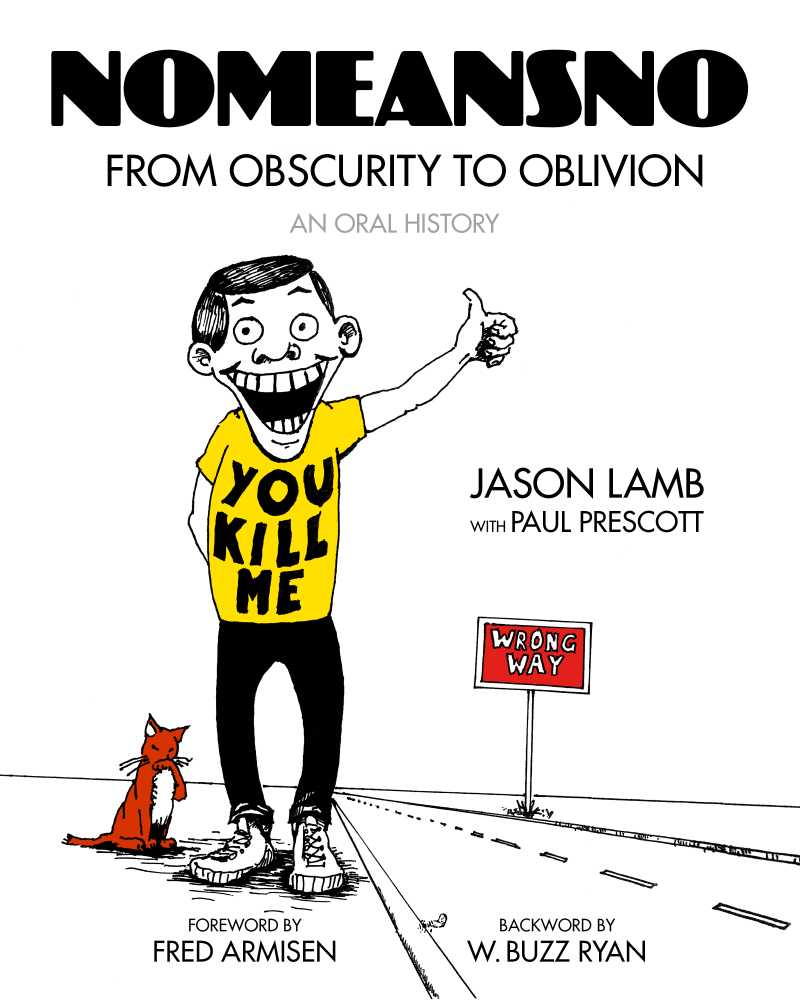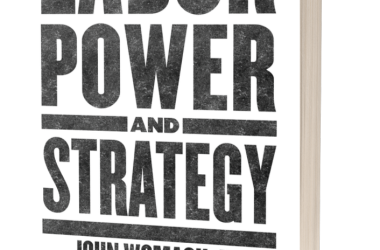By John Ackermann
CityNews
January 13th, 2024
From 1979 until their break-up in 2016, No Means No did things their own way, commercial success be damned. Now, the story of the legendary B.C. punk rockers is being told in a new book.
No Means No: From Obscurity to Oblivion follows the band that was “always a little smarter than everybody else” — be it for their music, their lyrics, or simply for their resistance to anything that stood in the way of their DIY ethos.
Co-author Jason Lamb is an admitted superfan, having seen the band “maybe 25 times over the years.” And yet, his book is not your typical fan-style publication. It looks at some hard truths about No Means No honestly and openly. Since it is an oral history, Lamb is free to let the band members and their associates speak for themselves.
John-Ackermann-speaks-to-Jason-Lamb-co-author-of-No-Means-No
“I’ve always loved the oral history style of biography, particularly music biographies. I’ve read many, many, many of them over the years. And it just made sense when I had the idea to do this, that this was the best way to tell the story,” he said.
“There are so many people in their orbit that I knew it needed to be told by the people that were there. And, of course, that ballooned very quickly, where I ended up interviewing about 500 people at the end of the day.”
Lamb admits writing an oral history was also more practical.
“I’m just not a very good writer, at least I don’t consider myself to be one. So, I don’t know if I would have been able to pull it off as just a narrative style. You know, if I could, it would have taken me much longer.”
Read more:
The band was originally formed in 1979 in Victoria by brothers Rob and John Wright. The core line-up was Rob on vocals and bass guitar and John on the drums. They would later be joined by guitarist Andy Kerr and his replacement Tom Holliston. Ken Kempster would serve as the band’s second drummer for a time as well.
Lamb sets the stage by explaining why punk rock was late to arrive in the B.C. capital.
“Things just got here a bit later because we felt a little isolated. There’s this isolation about being on the island that is undeniable. Even now,” he said.
“Isolation and [an] inability to connect properly other than literally writing letters to record labels or trading magazines and tapes. We were this little weird Island, [a] quirky, strange place.”
“The context was one of middle-class security,” said Rob Wright in the book. “Everyone’s fine, no one’s OD’d. Vancouver was much more hard-edged than that. And I don’t know if we would have prospered or existed in that kind of milieu.”
By 1986, the band had attracted the attention of Dead Kennedys frontman Jello Biafra, who signed the group to Alternative Tentacles, his independent record label. A US tour with DOA would follow as well as the first of many European tours.
However, No Means No would end up achieving only as much commercial success as they were comfortable with. Rob Wright summed it up best in the book when he said, “Why would we want to sell a million records? We would have to support that, and it would be terrible!”
Given that mindset, they were a tough band to promote — much to the frustration of manager Laurie Mercer, who once described his efforts as “a constant trail of heartbreak.”
“Poor Laurie. His job was to make this band famous. That’s literally his job,” Lamb said. “And he’s working with a band that doesn’t want it. People all around, these big muckety-mucks and record labels wanted No Means No to be famous and rich. And the band themselves were resistant to it. It’s very strange.”
Still, they marched on, eventually taking their status as elder statesmen in stride.
“They kind of had to, right from the beginning, because they always looked older than the kids in the crowd,” Lamb said. “Even when they were in their 20s, John and Rob both had gray hair, especially Rob, early on.”
The cover of the band’s 2004 greatest hits compilation The People’s Choice reproduces some fan-scrawled graffiti that tells them to “Give it up, granddads!” while another fan suggested they call their next tour The Antiques Roadshow.
No Means No would begin winding things down by the mid-2010s.
“That’s pretty much all Rob right there,” Lamb said. “So, Rob is eight years older than his brother John — a significant age difference. He was getting older. Touring was becoming a little harder, he was having back problems, he had two kids, and he wanted to be home and be a dad. That’s just what he wanted to do. And he told me he was starting to feel [like] he had said everything he needed to say.”
Despite their relatively low profile, No Means No picked up plenty of celebrity fans over the years — including musician, comedian, and former Saturday Night Live cast member Fred Armisen. His old band Trenchmouth once opened for No Means No. So, something of a coup for Lamb was talking Armisen into writing the foreword to the book.
“[I told him] ‘You’re kind of perfect because you’re not part of their story so much. But you are famous and forewords are always written by somebody famous.’ And then about a day later, he got back to me and said, ‘Yeah, okay, I’ll do it.’ I had to poke him a few times to remind him and then finally he wrote it. That’s how I got Fred.”
At the outset of the book, Lamb writes he hopes it serves as both an introduction for the uninitiated and a celebration for those who already adore the band — a love letter from “the folks who know.” It’s fair to say he has succeeded on both counts.
“I hope it’s accessible as well as just a really cool story about a Canadian band who did everything on their own terms from beginning to end,” he said.
No Means No: From Obscurity to Oblivion — An Oral History by Jason Lamb with Paul Prescott is published by PM Press. A book signing and Q-and-A event is set for Feb. 7 in Vancouver.





